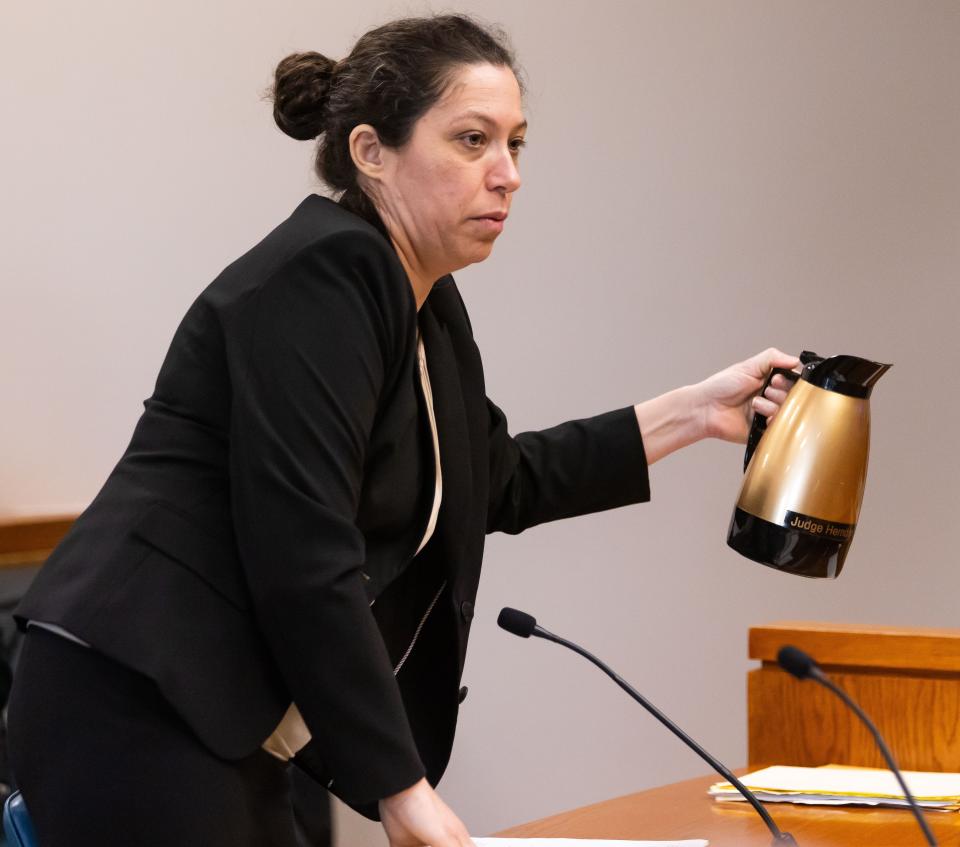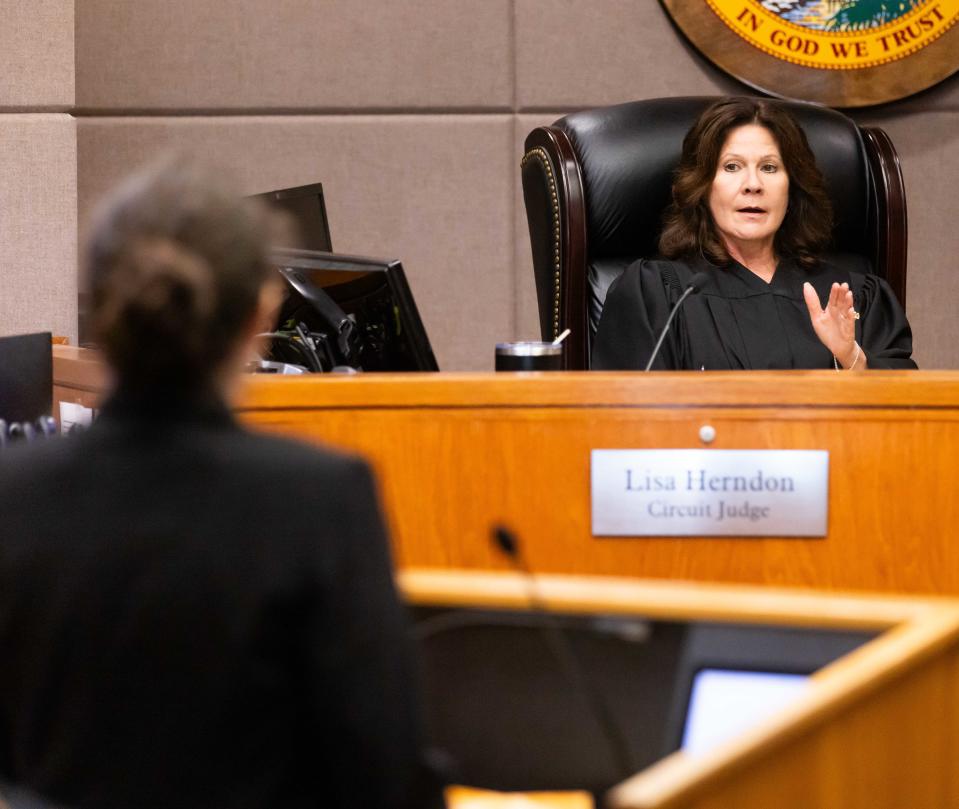Experts differ: Is woman, representing herself at murder trial, competent to proceed?
After Wednesday's lunch break, Assistant State Attorney Toby Hunt told the court his office had received a letter from Dr. Harry Krop regarding Neely Rayne Pesognellie Petrie Blanchard, the self-described sovereign citizen who is standing trial this week, charged with the shooting death of Christopher Hallett.
In the letter, Krop said Blanchard is incompetent to proceed at trial. Hunt said the state had an obligation to let the court know about this latest development.
The prosecutor said that, with no specifics or context of Krop's analysis, he wanted the state expert, Dr. Jason Demery, to examine Blanchard.
Calling it "unforeseen" and an "unusual situation," Circuit Judge Lisa Herndon ordered an evaluation for Blanchard. At that point, the judge dismissed the 13-member jury, which includes one alternate, for the day and told them to report back Thursday morning.
Competency hearing
About three hours later, Demery and Krop were available for a competency hearing.

Appearing via Zoom, Krop, a clinical psychologist, told the court he has met with Blanchard close to a dozen times since her arrest. Krop, who's expected to be an expert witness for the defense, said he met with Blanchard on April 11 and April 16. An associate familiar with Blanchard met h her on April 14 because he was unable to attend.
Krop said Blanchard has difficulty staying focused and he thinks she's incompetent to represent herself. Blanchard's competency has never been an issue until now. Asked if he thinks Blanchard may be malingering, he said no.
Krop told Assistant State Attorney Amy Berndt, the other lawyer prosecuting the case, that Blanchard is nervous and scared about being her own lawyer. Krop said since April 11, he has not seen any evidence of Blanchard informing jail officials she has mental issues.
Questioned further about Blanchard's state of mind, Krop told the court she has talked about being targeted. She has said that lawyers representing her have been killed and has compared herself with former President Donald Trump.
But Dr. James Demery, a psychologist and neuro-psychologist testifying for the state, said Blanchard is competent to continue standing trial. Demery said Blanchard talked about prosecutors making mistakes during her trial and she believes she's doing well. He said she can make a closing argument.
The judge said despite Krop's concern, Blanchard is competent to continue with the trial. Blanchard didn't object to the judge's ruling.
About the shooting
Blanchard is charged with first-degree murder with a firearm in Hallett's death. The shooting occurred at Hallett's Marion Oaks residence in November 2020.
Hallett fled to Georgia, where she was detained by law enforcement officials. She later was returned to Marion County and has been locked up at the county jail.
The 37-year-old Pensacola woman was upset that Hallett wasn't able to get her children back from state officials who had removed them, according to the prosecution.

Blanchard was staying at Hallett's home when she shot and killed him, according to court testimony. A woman and a girl were at the home at the time of the shooting. The girl, now an adult, testified she witnessed Blanchard shoot Hallett once.
Sheriff's deputies were called and found the witnesses. Deputies were able to track Blanchard using pings from her cellphone to Georgia.
Blanchard crying
During Wednesday's court session, Blanchard was emotional.
In her opening statement on Tuesday, Blanchard spoke glowingly of Hallett, calling him her mentor and friend who was in the courtroom with her, which gave her peace. She added that she was fighting for Hallett, his legacy, and for her life.
Hunt played a recording in court where Blanchard accused Hallett of betraying her and her reason for fatally shooting him.
Blanchard openly cried while listening to the recording. In the recording, Blanchard said she believed Hallett was part of a human sex trafficking ring taking advantage of children.
"I had to stop Christopher Hallett," she said.
According to the recording, Blanchard said she tried calling 911 from her phone to let them know what was happening, but the phone was blocked.
Blanchard said E-Clause, a company formed by Hallett to reunite children with their families taken by state officials, was not helping her and she had to do something. In Tuesday's testimony, it was revealed that Blanchard had been working with Hallett for three years.
Blanchard said in the recording that she didn't just shoot Hallett, she prayed about it. Blanchard said she did not know how many times she shot Hallett.
Berndt gave Blanchard a box of tissues. The judge took a break so Blanchard could compose herself.
Blanchard emotional a second time
Blanchard was emotional a second time when her sister, Savannah Hendricks, was on the witness stand.
Answering Berndt's questions, Hendricks said Blanchard has three children and they were removed from her sister's care.

Hendricks said not long after her sister's children were taken from her, she got involved with the sovereign citizen and QAnon fringe movements. The woman said several months before Hallett's murder, Blanchard told her that Hallett had been lying to her.
At one point, Hendricks said, her sister thought she and her mother had sent Blanchard's children to Hallett. Blanchard's mother has custody of two of Blanchard's three children, according to testimony.
On cross-examination, Blanchard asked her sister if their relationship had been strained. Most of the questions posed by Blanchard to her sister were personal, which Berndt objected to because they were not relevant to the case.
The sisters cried during the exchange.
Blanchard did ask her sister if she had been threatened, and she said yes, when Blanchard was arrested. Blanchard, who's older, asked her sister if she's afraid of someone and she said no.
Is there a lawyer in the house?
Before jurors were called into the courtroom, Blanchard told the court she's concerned about her trial and the direction of her case. She said her children need her and requested a lawyer.
The judge told her she had an attorney and she chose not to keep him. Blanchard said her previous counsel, Jack Maro, was not acting in her best interest and therefore she had no choice but to terminate his services.
Hunt told the judge Blanchard could have had a public defender, but she declined the offer. He said the trial has started and it's too late for her to ask for a lawyer.
The judge told Blanchard she has to live with her choice and must obey the rules of the court. Since Monday's jury selection, the judge or prosecutors had to repeatedly caution Blanchard about remaining on task. The judge has excluded motions filed by third parties for Blanchard.
Citing case law, the judge told Blanchard she had to continue representing herself as they're at "a critical stage" of the trial. The judge told Blanchard she thinks she's trying to use asking for an attorney as a ploy to delay the trial and they're moving ahead.
Contact Austin L. Miller at austin.miller@starbanner.com
This article originally appeared on Ocala Star-Banner: Ocala Florida murder trial continues; defendant's mental state questioned

